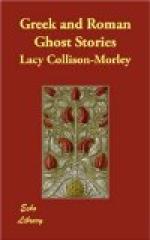Maximus of Tyre[40] also describes the island, and tells how sailors have often seen a fair-haired youth dancing a war-dance in golden armour upon it; and how once, when one of them unwittingly slept there, Achilles woke him, and took him to his tent and entertained him. Patroclus poured the wine and Achilles played the lyre, while Thetis herself is said to have been present with a choir of other deities.
If they anchor to the north or the south of the island, and a breeze springs up that makes the harbours dangerous, Achilles warns them, and bids them change their anchorage and avoid the wind. Sailors relate how, “when they first behold the island, they embrace each other and burst into tears of joy. Then they put in and kiss the land, and go to the temple to pray and to sacrifice to Achilles.” Victims stand ready of their own accord at the altar, according to the size of the ship and the number of those on board.
Pausanias also mentions the White Isle.[41] On one occasion, Leonymus, while leading the people of Croton against the Italian Locrians, attacked the spot where he was informed that Ajax Oileus, on whom the people of Locris had called for help, was posted in the van. According to Conon,[42] who, by the way, calls the hero Autoleon, when the people of Croton went to war, they also left a vacant space for Ajax in the forefront of their line. However this may be, Leonymus was wounded in the breast, and as the wound refused to heal and weakened him considerably, he applied to Delphi for advice. The god told him to sail to the White Isle, where Ajax would heal him of his wound. Thither, therefore, he went, and was duly healed. On his return he described what he had seen—how that Achilles was now married to Helen; and it was Leonymus who told Stesichorus that his blindness was due to Helen’s wrath, and thus induced him to write the Palinode.




